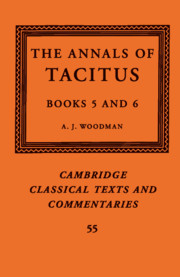Preface
Published online by Cambridge University Press: 05 January 2017
Summary
Fifty years ago F. R. D. Goodyear undertook to write a commentary on the first six books of Tacitus’ Annals for the series Cambridge Classical Texts and Commentaries. The series was the brainchild of the then Kennedy Professor of Latin at Cambridge, C. O. Brink, who worked on Tacitus intermittently throughout his life and had originally planned to contribute the Tacitus commentary himself; but a change of plan saw the Annals pass instead to Goodyear, whose doctoral dissertation on the Aetna had been supervised by Brink and now appeared in 1965 as the second volume in Brink's new series.
The sixties were a memorable and formative time for that fortunate generation with whose youth they coincided, but it is not for nothing that they were described by their most brilliant expositor as ‘the pendulum years’, the upswing of their hopes and aspirations often brought down to earth by the realities of subsequent decades. A projected commentary on the first six books of Tacitus’ Annals is nothing if not aspirational, but, as is well known, Frank Goodyear had commented on only the first two books before he sadly passed away in 1987, never to realise his ambition of moving on from Tacitus to Cicero, whom he described as ‘the master’ of Latin prose. It was Ronald Martin and I who produced a volume of commentary on Book 3 (1996), having already published a commentary on Book 4 for the alternative series Cambridge Greek and Latin Classics (1989). Alas, now Ronald too has passed away and, with the kind encouragement of Stephen Oakley and Michael Sharp, I have here added a volume on Books 5 and 6. I very greatly regret that I can no longer test out my ideas on Ronald, whose own commentary on these same books appeared in 2001; my volume will be the poorer for his absence.
It is a daunting experience to dare to conclude a task left unfinished by one's doctoral supervisor, especially when that supervisor was a scholar as formidable as Frank Goodyear. He could be as ferocious in person as he was in print, yet he showed me the greatest kindness and, in the twelve months of 1966 that I was under his direction, he provided me with incomparable training for the scholarly life.
- Type
- Chapter
- Information
- The Annals of TacitusBooks 5–6, pp. ix - xiPublisher: Cambridge University PressPrint publication year: 2016

